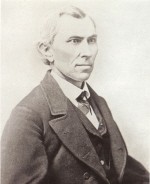William Williams
William Williams, professor of ecclesiastical history 1859-1877, was born at Eatonton, Georgia, on March 15, 1821. He was converted and united with a Baptist church in 1837, and graduated from the University of Georgia in 1840.
After college, Williams directed his attention to law. He graduated from Harvard University Law School in 1847. Through his studies in law, Williams developed the ability to speak with clarity and potency. Fellow founder John Broadus noted that “he had extraordinary power in the clear and terse statement of truth, and when kindled in preaching or lecturing he spoke with such intensity as is rarely equaled.” (1) In 1851 he became the pastor of a small Baptist church in Auburn, Alabama.
Williams became professor of theology in Mercer University in 1856, replacing noted Baptist theologian J. L. Dagg in that post. In 1859, Southern invited Williams to fill a teaching slot originally slated for E. T. Winkler. A popular professor, Williams came under fire from Landmark Baptists in 1872 for teaching that some “alien immersions” were valid. He argued that Baptist churches need not in every case “rebaptize” believers who received baptism by immersion in non-Baptist churches. Boyce sensed a swell of opposition against Williams on this matter and so switched chairs with him. For a time, Williams taught systematic theology while Boyce taught ecclesiastical history and polity. The decision proved wise and Williams remained at Southern until he passed away.
Several times a vice-president of the SBC, Williams preached the convention’s twenty-fifth annual sermon at St. Louis in May 1871. He published one book, Apostolic Church Polity, published in 1874. Williams died at Aiken, South Carolina, Feb 20, 1877, and was buried at Greenville, South Carolina, where his former students erected a monument to his memory.
(1) John Broadus, Memoir of James P. Boyce, 203.
Any historical record of the founders of the Southern Baptist Convention, and The Southern Baptist Theological Seminary, is incomplete without an honest telling of their complicity in American slavery and racism. For more on that story, read here.

